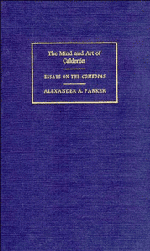
-
Select format
-
- Publisher:
- Cambridge University Press
- Publication date:
- February 2012
- January 1989
- ISBN:
- 9780511897917
- 9780521121170
- Dimensions:
- Weight & Pages:
- Dimensions:
- (229 x 152 mm)
- Weight & Pages:
- 0.63kg, 432 Pages
You may already have access via personal or institutional login
Book description
Don Pedro Calderón de la Barca (1600–81) was, with Lope de Vega, the greatest exponent of Spanish Golden Age drama. Professor Parker's essays are the fruits of a highly distinguished career spanning forty-five years. They provide a wide-ranging survey of Calderón's secular, three-act plays (comedias) through detailed analyses of individual works. The themes found in the plays are studied in relation to the background of ideas in seventeenth-century Spain and to the development of Calderón's own view of the intellectual life and the social, ethical and moral problems of this age. From the tensions of Calderón's early family life and his intellectual struggle with the associated problems, the book passes to the wider tensions in the social and political life of his time, and concludes with a demonstration of how Calderón raises all these human problems onto a wide 'philosophical' level through his use of myths and symbols.
Contents
Metrics
Altmetric attention score
Full text views
Full text views help Loading metrics...
Loading metrics...
* Views captured on Cambridge Core between #date#. This data will be updated every 24 hours.
Usage data cannot currently be displayed.
Accessibility standard: Unknown
Why this information is here
This section outlines the accessibility features of this content - including support for screen readers, full keyboard navigation and high-contrast display options. This may not be relevant for you.
Accessibility Information
Accessibility compliance for the PDF of this book is currently unknown and may be updated in the future.


